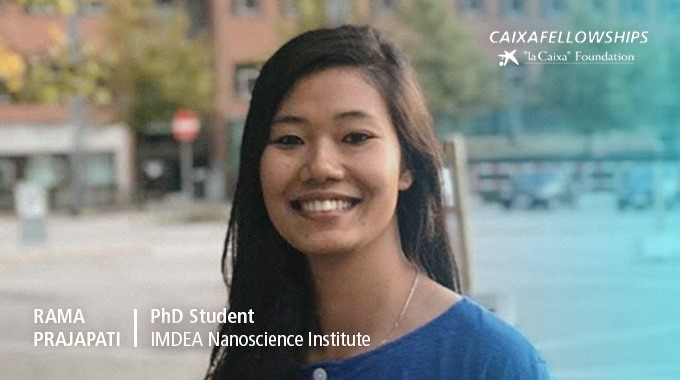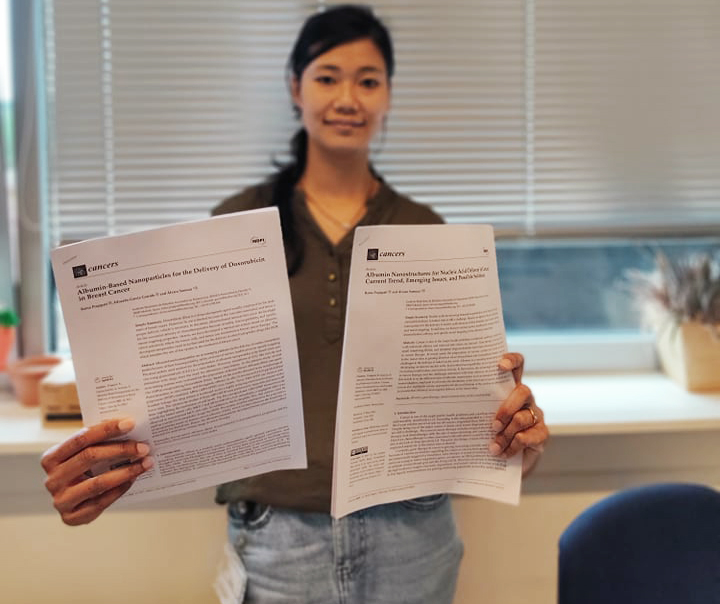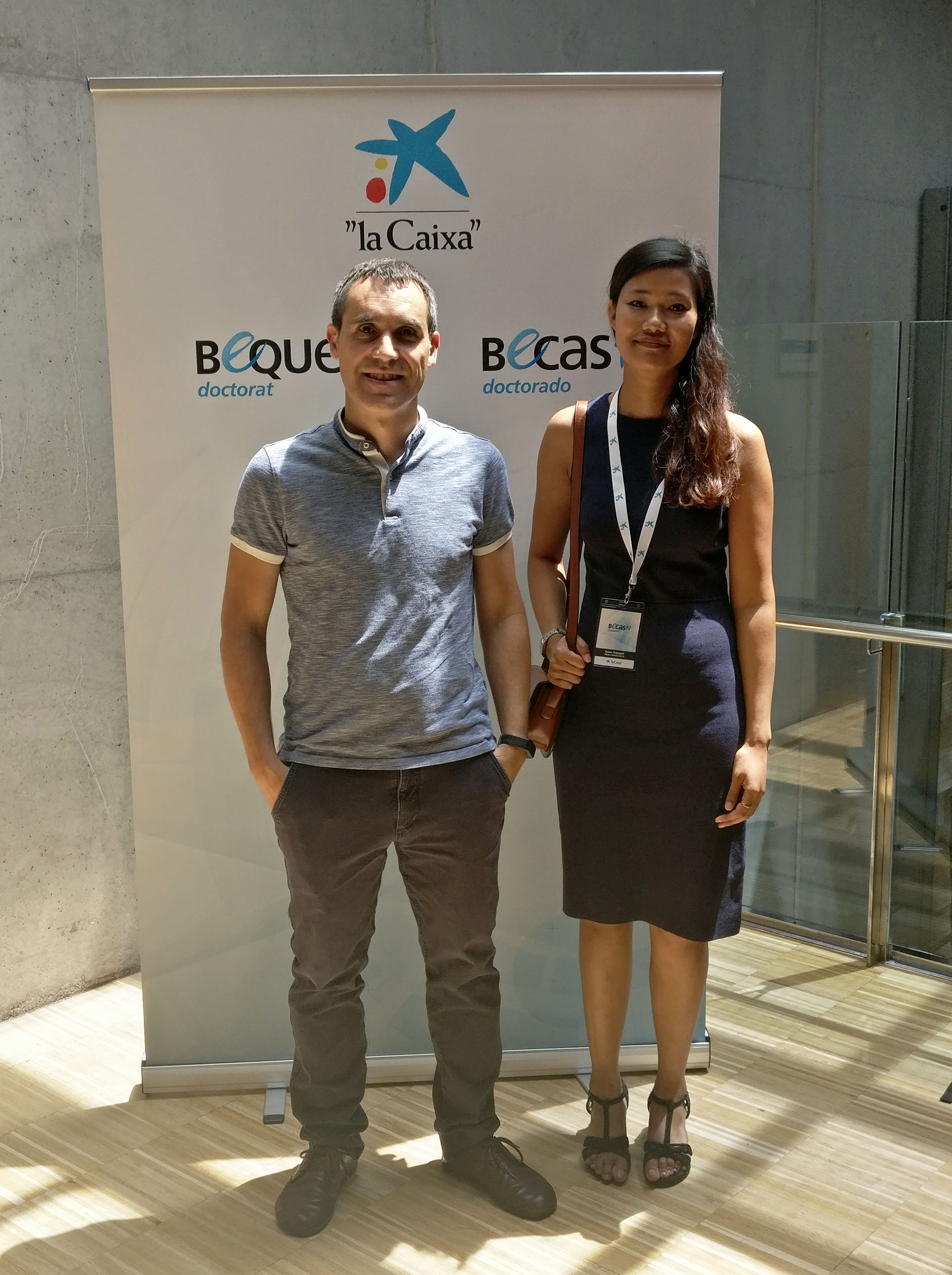La Caixa INPhINIT fellow Rama Prajapati’s research provides a new insight into the delivery of therapeutic molecules against cancer
19.07.2021

- PhD student Rama Prajapati’s work on albumin nanostructures for delivery in cancer has been recently published in the journal Cancers.
- Rama Prajapati is a “la Caixa” INPhINIT fellow working at IMDEA Nanociencia in the Nanobiotechnology Group led by Dr. Álvaro Somoza.
Madrid, July 19th, 2021. The use of chemotherapy is generally limited because of the side effects due to the lack of drug specificity. Hence, a proper drug delivery vehicle is necessary to administer the medicine only where is needed and reducing thus the toxicity of the treatments. The Nanobiotechnology Group at IMDEA Nanociencia, led by Dr. Álvaro Somoza, focuses on the use of bioactive molecules in nanomedicine. Within the group, Rama Prajapati -PhD student awarded with an INPhINIT “la Caixa” Fellowship- focuses on developing nanocarriers for the successful delivery of chemotherapeutics against cancer. Rama talks with us about her recent two publications in the journal Cancers.
 Tell us about your research
Tell us about your research
I am working with albumin nanostructures for the delivery of chemotherapeutics and nucleic acids in cancer. In my first article I tried to optimize the preparation of albumin nanoparticles using various crosslinkers. I chose the optimal crosslinker and then prepared the nanoparticles encapsulating the chemotherapeutic agent, doxorubicin. I observed that the particles accumulated in breast cancer cells and induced toxicity in those cells, but not in the non-tumoral cells.
Why did you choose doxorubicin and albumin nanoparticles?
Albumin is considered safe and biocompatible. And, doxorubicin is a widely investigated drug, but its use is limited because of its toxicity. It is fluorescent too, so it is easy to track its presence in the body and cancer cells. The encapsulation of doxorubicin in albumin nanoparticles was hence interesting for us.
What is the novelty of your studies?
The preparation of albumin nanoparticles is most commonly being done by the use of a crosslinker, glutaraldehyde. However, the alternative needs to be searched because of its toxicity and possible interaction with the drugs. Hence, we tried to optimize the nanoparticles preparation with the use of other crosslinkers. The one used in our study releases the drug in an acidic and reducing environment, mimicking the cancer environment.
What are the next steps for your work?
The next step in the development of optimal nanoparticles would be to test them in animals. We are already working on it. I am now doing a research stay in KU Leuven, Belgium, in the group of Prof. Susana Rocha. Here, I am working on creating the 3D models of cancer and studying the effect of the nanoparticles in those spheroids. My plan is to reach the animal study phase before I finish my PhD.
 How “la Caixa” Foundation helped you through your PhD?
How “la Caixa” Foundation helped you through your PhD?
First of all, without the funding I couldn’t have started the PhD, of course. But apart from that, I am grateful for the motivation we all fellows have received through the training programmes. “la Caixa” has helped us with the PhD part, but not only that. They are also motivating us with our career development, what to do after our PhD, how to network effectively… etc.
How did you come to the idea? Tell us about the beginning of the story…
I was fascinated by cancer nanomedicine and I have always wanted to work in that field. I was looking for a position when I found “la Caixa” Fellowships. Through “la Caixa” Foundation I came across IMDEA Nanociencia.
Rama Prajapati is a PhD student at Nanobiotechnology group, led by Prof. Álvaro Somoza at IMDEA Nanociencia in Madrid. Rama was awarded an INPhINIT grant by “la Caixa” Foundation in 2018 to pursuit her doctoral studies.
References:
R. Prajapati, E. García-Garrido and Á. Somoza. Albumin-Based Nanoparticles for the Delivery of Doxorubicin in Breast Cancer. Cancers. 2021. DOI: 10.3390/cancers13123011
R. Prajapati and Á. Somoza. Albumin Nanostructures for Nucleic Acid Delivery in Cancer: Current Trend, Emerging Issues, and Possible Solutions. 2021. DOI: 10.3390/cancers131434
Contact
Dr. Álvaro Somoza
alvaro.somoza [at]imdea.org
https://nanociencia.imdea.org/nanobiotechnology/group-home
Twitter: @alvarosomoza
IMDEA Nanociencia Outreach Office
This email address is being protected from spambots. You need JavaScript enabled to view it.
+34 91 299 87 12
Twitter: @imdea_nano
Facebook: @imdeananociencia
Instagram: @imdeananociencia
Source: IMDEA Nanociencia




